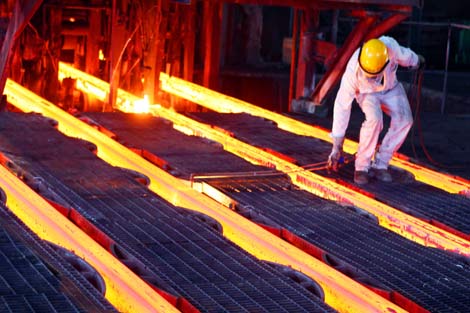A steel production line in Ganyu, Jiangsu province. A Bank of Communications report predicts China's GDP will pick up in the second half after slowing to 7.8 percent in the first half of the year. [Photo / China Daily]

Bank forecast says nation's economy will still expand 8 percent this year
China needs to find a balance between supporting a slowing economy and too much stimulus that may further unbalance the economy, the Bank of Communications said on Wednesday.
"Currently, China faces more risks from inflation than deflation," said Lian Ping, the bank's chief economist.
Lian said global demand may improve in the second half, as the eurozone stabilizes, and the United States and Japan experience moderate recovery, which will reduce the pressure on China's exports.
Domestically, he said, a healthy job market and growing individual incomes suggested that the economic slowdown is still under control.
"Policymakers should guard against possible investment fever caused by misused stimulus funding, as well as a possible rise in prices after economic growth rebounds," Lian said.
Despite 7.6 percent GDP growth in the second quarter, the world's second-largest economy will still expand by 8 percent this year, according to the bank's Economic and Financial Outlook for the second half.
But this year will also mark the turning point in the country's potential growth. "In the long term, growth will be lower than the current level," Lian said.
"In the second half, the government should make more efforts to strike a balance between inflation and growth, as well as the shrinking revenue of the banking system amid interest rate reform," Lian said.
According to the bank's estimate, newly added yuan holdings for foreign-exchange purchases, an indicator of capital flows, may fall significantly to 1 trillion yuan ($157 billion) this year from 2.8 trillion yuan in the previous year.
Foreign purchases in the first half of the year, which were slightly more than 300 billion yuan, were only one-seventh of the amount in the same period last year.
The decrease will be a result of the shrinking trade surplus and less foreign direct investment, as well as weakening demand for foreign exchange settlement as expectations of renminbi appreciation diminish.
The trade surplus will continue to decline to $150 billion this year, while FDI will be around $120 billion, according to the bank's forecast.
"To offset the liquidity shortage caused by falling foreign purchases, the authorities will adopt more flexible and foresighted monetary policies based on their overall prudent stance, including one to three reserve requirement ratio cuts.
"But considering the still high broad money supply (M2) to GDP ratio, and possible rebounds in inflation and housing prices, the money supply should not grow too fast," the bank said.
To that end, there isn't much room for interest rate cuts to any large extent, though one more may be in the pipeline to resolve the financing strains faced by companies.
"We were always trying to find the reasons why we're different from other countries. Actually, every country has its own unique advantages, but it may not be enough to help you out of the crisis," said Qu Lewei, a fund manager with Schroders Fund Management Co Ltd.
"China's economic bubble was already big during 2006 and 2007, but investors were confident that the companies' good performance in the stock market was enough to 'fill the bubble'.
"But it has been proven that when the demographic bonus is diminishing, there is no way to avoid economic downturn," he said.
"If the eurozone crisis is not properly handled, and China's macroeconomic adjustment fails to achieve its goals, there will be a great chance that confidence in the A-share market will collapse again," said Hong Hao, a researcher with BOCOM International.
But Qu wasn't that pessimistic. "There is no need to panic, as we're already at the bottom, and there are no new challenges which we don't already know about."
Qu said the stock market wouldn't dip much further, and there are still opportunities in industries such as the non-banking financial sector, as well as the environmental protection, pharmaceutical, and high-end equipment manufacturing industries.
weitian@chinadaily.com.cn
